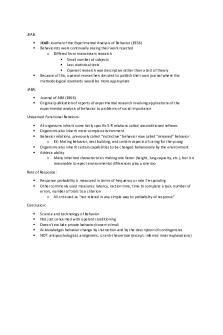P181-Jack Michael Unit 1 PDF

| Title | P181-Jack Michael Unit 1 |
|---|---|
| Author | Jessica Barbour |
| Course | Experimental Analysis of Behavior |
| Institution | California State University Sacramento |
| Pages | 1 |
| File Size | 46.7 KB |
| File Type | |
| Total Downloads | 16 |
| Total Views | 143 |
Summary
Self-guided study with Jack Michael notes....
Description
JEAB:
JEAB: Journal of the Experimental Analysis of Behavior (1958) Behaviorists were continually seeing their work rejected o Differed from mainstream research Small number of subjects Less statistical tests Operant research was descriptive rather than a test of theory Because of this, operant researchers decided to publish their own journal where the methodological standards would be more appropriate
JABA:
Journal of ABA (1968) Original publication of reports of experimental research involving applications of the experimental analysis of behavior to problems of social importance
Unlearned Functional Relations:
All organisms inherit some fairly specific S-R relations called unconditioned reflexes Organisms also inherit more complex environment Behavior relations, previously called “instinctive” behavior now called “released” behavior o EX: Mating behavior, nest building, and certain aspects of caring for the young Organisms also inherit certain capabilities to be changed behaviorally by the environment Athletic ability o Many inherited characteristics making one faster (height, lung capacity, etc.), but it is reasonable to epect environmental differences play a role too
Rate of Response:
Response probability is measured in terms of frequency or rate f responding Other commonly used measures: latency, raction time, time to complete a task, number of errors, number of trials to a criterion o All criticized as “not related in any simple way to probability of response”
Conclusion:
Science and technology of behavior Not just concerned with operant conditioning Doesn’t exclude private behavior/covert stimuli Acknowledges behavior change by instruction and by the description of contingencies NOT: antipsychological, antigenetic, or anti-theoretical (except: inferred inner explanations)...
Similar Free PDFs

P181-Jack Michael Unit 1
- 1 Pages

Essay Assignment 1 - Michael Yoo
- 3 Pages

Unit 1 - Unit 1 notes
- 18 Pages

Michael Thonet
- 2 Pages

Michael Simpson
- 3 Pages

UNIT 1 - Mcq of unit 1
- 10 Pages

AI-Notes unit 1 - Unit 1
- 10 Pages

Unit 1 Quiz - Unit 1 quiz
- 5 Pages

Unit 1CSSelf-Quiz Unit 1
- 6 Pages

Lecture 1 Unit 1
- 2 Pages

Unit 1 - Chapter 1
- 6 Pages

Unit 1 Assignment 1
- 27 Pages
Popular Institutions
- Tinajero National High School - Annex
- Politeknik Caltex Riau
- Yokohama City University
- SGT University
- University of Al-Qadisiyah
- Divine Word College of Vigan
- Techniek College Rotterdam
- Universidade de Santiago
- Universiti Teknologi MARA Cawangan Johor Kampus Pasir Gudang
- Poltekkes Kemenkes Yogyakarta
- Baguio City National High School
- Colegio san marcos
- preparatoria uno
- Centro de Bachillerato Tecnológico Industrial y de Servicios No. 107
- Dalian Maritime University
- Quang Trung Secondary School
- Colegio Tecnológico en Informática
- Corporación Regional de Educación Superior
- Grupo CEDVA
- Dar Al Uloom University
- Centro de Estudios Preuniversitarios de la Universidad Nacional de Ingeniería
- 上智大学
- Aakash International School, Nuna Majara
- San Felipe Neri Catholic School
- Kang Chiao International School - New Taipei City
- Misamis Occidental National High School
- Institución Educativa Escuela Normal Juan Ladrilleros
- Kolehiyo ng Pantukan
- Batanes State College
- Instituto Continental
- Sekolah Menengah Kejuruan Kesehatan Kaltara (Tarakan)
- Colegio de La Inmaculada Concepcion - Cebu



